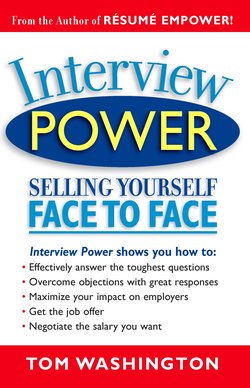Читать книгу Interview Power - Tom Washington - Страница 34
На сайте Литреса книга снята с продажи.
3. Identify skills.
Оглавлениеa) Study the sample accomplishments on pages 46-48 to see how skills and qualities are identified. Skills are important, but personal qualities and characteristics are just as important. As a skill you might say, “produce highly effective marketing plans.” As a quality you might say, “extremely reliable,” “work well with people,” “hard worker,” or “able and willing to take on greater responsibility.” In actuality, these characteristics are skills.
b) Identify skills and qualities using phrases. Again, study the examples. In almost all cases a phrase has more impact than a single word. “Persistent” is a good word, but it doesn’t have the same impact as, “I never give up until the job is done right.” “Organizing” doesn’t have the same impact as “Effectively plan and organize projects and obtain high quality results.” Use words like excellent, effective, effectively. Words like those remind you that you didn’t just do it, but that you did it well.
c) Identify as many skills as you can, even if you feel the same skills were identified in other accomplishments. If a particular skill has been used in several accomplishments, that tells you a lot about yourself. Probably it is a skill that you are very good at and enjoy using. Having used the skill in several accomplishments also allows you to select the very best experience when you are about to mention that skill in an interview.
d) One way to identify skills is to pull them right out of your descriptions. Often you can take a phrase almost word for word out of your accomplishment.
e) Don’t skip the obvious skills. Sometimes a skill is so obvious to a person that it doesn’t seem valuable or important. Go ahead and quickly write it in.
f ) Don’t skip a skill just because you think everyone can do it. Even if it is a common skill, it should still be listed. Often, however, a person only believes everyone can do it. This happens because the person has been skilled at it for a long time, and cannot remember a time when he or she could not do it. Because of that, it’s easy to assume that anyone can do it. Don’t get caught in that trap.
g) With your remaining accomplishments devote up to two minutes for each and identify the two or three most obvious skills.
Study the previous examples of accomplishments to get ideas on how to write about accomplishments and how to identify skills.
Involve someone in the process of identifying skills. It could be a friend, relative, or spouse. It’s good if you can find a person who is in the same situation, so you can go through this process together. Each of you will be able to give considerable insight to the other.
Have this person read one of your accomplishments. Then the two of you would discuss it as you provide more details. Have the person ask you questions to clarify anything which is unclear. This will help you tell more concise and clear stories during interviews. Telling the story out loud will help you recall the experience even better and will give you good practice for interviews. By discussing the experience with you, your helper will identify skills that would have been missed if that person had merely read what you wrote. People find it enjoyable to talk about their accomplishments and to receive positive feedback from someone they respect. As you speak, the person should write down any skills which come to mind. Then the person will give you feedback when you’re through describing the experience. Rather than simply reading back what was written, the person should expand on it and describe what convinced him or her that you have that skill. It might go like this:
I wrote “You stand up for what you believe and provide leadership for others.” I think it took a lot of guts to stand up to management and request, or almost demand, that safety out in the plant get more attention. Once you took the stand others were willing to back you up. I think that’s what leadership is all about.
Writing about your accomplishments will prove enjoyable and enriching. Invariably people report their self-confidence increases as they become more aware of the positive things they’ve done.
Take the time to recall your accomplishments and identify your skills. Follow the instructions carefully. They are based on feedback from hundreds of people and will make the task much easier. Don’t try to do it in one sitting. Spread it out over several days. Have fun with this exercise.
